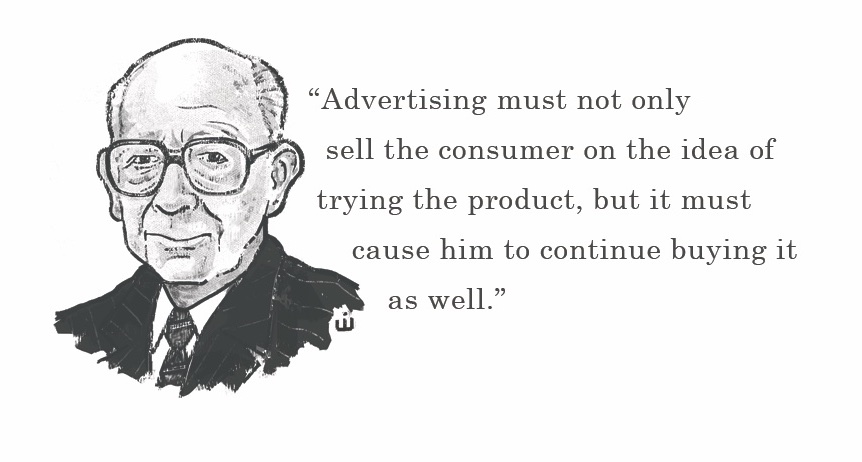“Data is an expense – knowledge is a bargain. Collect only data that can become information, which, in turn, can become knowledge. Only knowledge can build on success and minimize failure. A company is no better than what it knows.” —Lester Wunderman, from his book Being Direct
Lester Wunderman was born in Bronx, New York in 1920. His father, a fur manufacturer, died on the cusp of the Great Depression. A gifted student, Wunderman graduated at 16 from DeWitt Clinton High School in the Bronx. He dropped out of Brooklyn College after one year to take an office job and help support his family in the Depression.

At 19, he and his brother Irving organized the Coronet Advertising Service. It failed. But in 1942 they fashioned a kind of buy-one-get-one-free offer to work for a single salary for a mail-order agency, Casper Pinkster.
In 1947 when he was 27 years old, Wunderman was hired as a copywriter at Maxwell Sackheim & Co. He went on to rise to vice president at the firm and while working there he introduced a “direct marketing” approach to better service the agency’s clients. His objective was to develop a more personal connection with potential customers than general advertising had previously made possible.
A decade later, intent on expanding the direct marketing approach he developed at Maxwell Sackheim, Wunderman, his brother Irving, along with two colleagues, Ed Ricotta and Harry Kline, combined assets of $60,000 founded their own agency, Wunderman, Ricotta & Kline. The new agency’s first office was a $30-a-night room at the Hotel Winslow in New York City.
The firm opened its doors with a staff of seven. There were no clients. Nevertheless, WR&K attracted more than $2 million in billings during its first year. When Mr. Wunderman retired four decades later, Wunderman Cato Johnson, as the firm was then known, had 69 offices in 39 countries and annual billings that exceeded $1.8 billion.
His Signature Achievements
“The satisfaction of doing something unique, creative, and individual will change you forever.” -Lester Wunderman
Wunderman sent personalized ads to preselected people for products and services that they might actually want to buy, as opposed to the scattershot approach of general advertising for mass audiences. Using ZIP codes and research databases to identify likely customers, his teams reached people at home with mailings, promotional letters, phone calls, and newspaper and magazine inserts. Sales rose dramatically with the help of his breakthrough ideas:
- Toll-free telephone numbers for ordering
- Postage-paid return cards and envelopes
- Buy-one-get-one-free offers
- Loyalty reward programs

Among his signature achievements, in 1958 (his new agency’s first year of existence), Wunderman was responsible for the research, business development plan, and launching of the American Express Card. This is evidence of and an outcome of Wunderman’s concern for the customer. In a world of self-promotion, Wunderman cut hard against the grain. And it worked.
Wunderman helped invent the Columbia Records mail-order business and he helped create the ZIP-code system for the U.S. Post Office. Other advertising legends are known for their brilliant ad campaigns. Lester Wunderman innovated on a much larger scale.
An Injection of New Thinking

Wunderman wrote two books, Frontiers of Direct Marketing and Being Direct: Making Advertising Pay. Being Direct has been translated into many languages, including Mandarin and Japanese. In the book, he describes “19 Things That All Successful Direct Marketing Companies Know.” The second of 19 items in his list is: “The Consumer, Not the Product, Must Be the Hero.” If today’s ad makers can learn anything from Wunderman, let it be this.
It’s interesting that direct mail became known to many as “junk mail.” Interesting because it’s not junk when the offer is highly targeted and creatively presented to an interested buyer.
Lester Wunderman helped regional brands like LL Bean take their wares direct to the consumer in all 50 states and across the world. It wasn’t junk that built his fortune or his clients’, it was his unique ability to get to know the customer well. Wunderman helped transform companies and an entire industry by keeping an eye on the prize—pleasing the customer and increasing his clients’ profits.
Lester Wunderman’s Incredible Legacy
“Those marketers who ignore the implications of our new individualized information society will be left behind in what may well come to be known as the age of mass production and marketing ignorance.” —Lester Wunderman at MIT, November 29, 1967
Lester Wunderman came to the office and worked well into his 90s. He died on January 9, 2019, at the age of 98 in New York. His agency and his legacy live on today as the recently merged and reimagined Wunderman Thompson.
According to his obituary in The New York Times, Wunderman had homes in Manhattan and the South of France, and he was a notable photographer who exhibited at the Metropolitan and other museums and in galleries in the United States and France. With Cornell Capa, he helped found the International Center of Photography in New York.
Like ad legends Mary Wells Lawrence and Hal Riney, Wunderman rose from a humble background to the very top of the ad industry. Like ad legends Raymond Rubicam and Bill Bernbach, he was a Brooklyn kid who instinctively knew how to reach people and how to move them. Like ad legends David Ogilvy and Rosser Reeves, Wunderman believed in sales first and foremost and he found new and innovative ways to use brand communications to deliver them at scale.
Wunderman said that he wouldn’t call Direct Marketing “Direct Marketing” today. If he had a chance to do it over, he’d call it “Personal Advertising.” I love this insight and evolution of the core idea—when you make it about the customer and continue to find better ways to serve their individual needs, you win.
